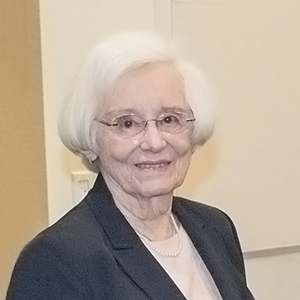Patricia Langenberg, PhD
Professor emeritus, School of Medicine
 Honorary University Marshal
Honorary University Marshal
Patricia Langenberg made many contributions to the University of Maryland School of Medicine in research, education, and service during her 25 years in the Department of Epidemiology and Public Health (EPH). She played a large role in developing and growing academic programs in the EPH, which presented her with a Lifetime Achievement Award in 2016.
Her teaching, mentoring, and pioneering efforts to make inroads in women’s health have been transformative and long-reaching. Especially noteworthy is Langenberg’s sustained commitment to graduate education since, and well before, coming to the University of Maryland, Baltimore (UMB).
She graduated in 1953 with a bachelor’s in mathematics and statistics from Iowa State University and received a graduate teaching certificate in 1959 in mathematics from the University of California, Berkeley. She received her master’s in mathematics in 1975 and PhD in 1978 from Temple University. She began her academic career in 1975 as an Instructor at LaSalle College, became an assistant professor at Temple University in 1980, and also taught at the University of Illinois.
In 1990, Langenberg was recruited by the University of Maryland School of Medicine as an associate professor in the Department of Epidemiology and Public Health, and was promoted to professor in 1997. From 1995 to her retirement in June 2015, she served as vice chair for academic programs. She also served as director of the Graduate Program in Epidemiology, and later as vice chair for academic programs. She chaired the departmental Appointment, Promotion and Tenure Committee, as well as serving on EPH’s Executive Committee, the IRB, and a number of other committees.
Langenberg shouldered the primary responsibility for EPH’s extensive education programs; served as course master of several difficult, high-level statistical courses; served as a small group leader for medical students; and mentored doctoral and master’s level students and junior faculty members. Her course evaluations were excellent, and she clearly is a beloved figure to many students, alumni, and junior faculty who have advanced in their careers.
In 1993, Langenberg founded the Women’s Health Research Group (WHRG), which brought together investigators from across the UMB campus interested in women’s health. The network enabled researchers from a variety of disciplines to connect and tackle multidisciplinary research and support a postdoctoral scholar. Langenberg led the way, from obtaining seed grants to jump-start the program, holding an annual symposium for over 12 years, to securing two large grants, the Department of Health and Human Services-funded Center of Excellence in Women’s Health, as well as the National Institutes of Health (NIH) Office of Research in Women’s Health BIRWCH K-12.
The BIRWCH (Building Interdisciplinary Research Careers in Women's Health) grant provides approximately $500,000 annually over five years to support four early stage investigators. It has been renewed twice for five years, and is in its 15th year of successive funding. The dozens of scholars who have completed the program have received NIH awards in excess of $14 million despite a difficult funding climate. Collectively, scholars have produced more than 400 articles in peer-reviewed journals and most have since been promoted to associate or full professor rank.
Langenberg herself has authored or co-authored more than 225 peer-reviewed publications. Because the role of biostatisticians at UMB has been primarily to provide statistical support for funded research, the majority of her research and publication has been collaborative. Her expertise is in women’s health research, and has served as the primary biostatistician on several large grants in that area over the years. She also has expertise in randomized clinical trials, and served as biostatistician for coordinating centers of several large multi-center trials.
In addition, Langenberg has served in a leadership role on numerous “heavy-lifting” committees within the EPH, all of which required intensive time and energy. Her involvement has not waned at all through the years. Before retiring, she served on the Accreditation Committees for two cycles, as well as on the MPH Program Executive Committee. She also was heavily involved in establishment of, and curricular development for, the recent MSHS/PA program.
At the University level, Langenberg served on the General Clinical Research Center (GCRC) advisory committee and as the director of the GCRC Biostatistics Core, the Data and Safety Monitoring Committee for the Maryland Psychiatric Research Center (MPRC), and on the Graduate Council, joint with UMBC, for two separate two-year terms. She also served on the Intercampus Steering Committee, Collaborative School of Public Health.
At the national level, Langenberg served for 12 years on the Observational Studies Monitoring Board for National Institute of Child Health and Human Development. Between 1997 and 2002, she chaired the Scientific Merit Review Board, Department of Veterans Affairs. She was a member of the National Cancer Institute Special Review Panel, as well as a member of the Governor’s Council on Women’s Health Promotion for the state of Maryland. She also served as reviewer for a number of journals, as a proposal referee for NIH agencies, and as a member of the editorial board for the Journal of Women’s Health.
Langenberg also has been generous in giving back to the School of Medicine. With her husband, former University System of Maryland Chancellor Donald Langenberg, PhD, she funds an annual Langenberg Award, which is bestowed upon a student who has shown great promise in and commitment to a career in epidemiology or women’s health. The winner receives a prize of $2,000.


